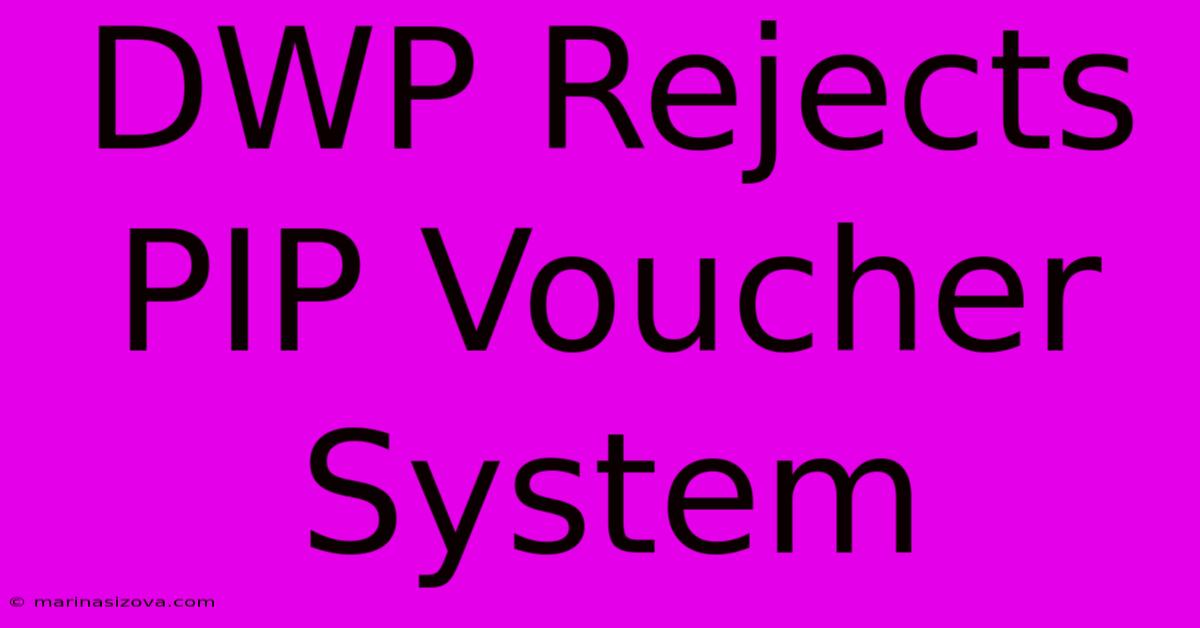DWP Rejects PIP Voucher System

Discover more detailed and exciting information on our website. Click the link below to start your adventure: Visit Best Website. Don't miss out!
Table of Contents
DWP Rejects PIP Voucher System: A Blow to Disabled People?
The Department for Work and Pensions (DWP) has recently rejected a proposal to introduce a voucher system for Personal Independence Payment (PIP). This decision has sparked debate, with some praising the DWP for prioritizing cash payments, while others argue the voucher system could have benefited disabled people.
What was the proposed voucher system?
The proposed system would have seen PIP recipients receive vouchers instead of cash payments for some of their benefits. These vouchers could have been used to purchase specific goods and services, such as groceries, toiletries, and mobility equipment. Proponents of the voucher system argued that it would have provided greater control over how benefits are spent, preventing misuse and ensuring that money goes towards essential needs.
Why did the DWP reject the voucher system?
The DWP stated that it rejected the voucher system because it would be too complex and costly to implement. They also argued that it would be discriminatory to disabled people, as it would restrict their freedom to spend their benefits as they see fit.
Arguments against the voucher system
Many disability rights groups and individuals with disabilities have voiced their opposition to the proposed voucher system. They argue that:
- It undermines individual autonomy: Vouchers would restrict the choices of disabled people, forcing them to spend their benefits on pre-determined goods and services, regardless of their individual needs.
- It perpetuates stigma and discrimination: The use of vouchers could perpetuate negative stereotypes about disabled people, implying that they are unable to manage their finances responsibly.
- It could lead to social exclusion: Vouchers could limit access to goods and services available outside the voucher scheme, further isolating disabled people.
Arguments in favor of the voucher system
Despite the opposition, some argue that a voucher system could have had benefits, such as:
- Preventing misuse: Vouchers could help ensure that benefits are spent on essential needs, preventing fraud and misuse.
- Encouraging responsible spending: Vouchers could encourage disabled people to make more informed purchasing decisions.
- Providing access to affordable goods and services: Vouchers could be used to negotiate discounts and access to affordable goods and services specifically tailored to the needs of disabled people.
What are the implications of the DWP's decision?
The DWP's decision to reject the voucher system has been welcomed by many disability rights groups. They see it as a victory for disabled people's autonomy and a recognition of their right to spend their benefits as they see fit.
However, the decision also raises questions about the ongoing struggle for financial independence and inclusion for disabled people. While the DWP may have rejected the voucher system, the need for affordable access to goods and services tailored to the needs of disabled people remains a pressing issue.
Moving forward
The DWP's decision highlights the ongoing debate surrounding the best way to support disabled people financially. Further discussion and consideration are needed to ensure that benefits systems are truly inclusive and empower disabled people to live fulfilling and independent lives.

Thank you for visiting our website wich cover about DWP Rejects PIP Voucher System. We hope the information provided has been useful to you. Feel free to contact us if you have any questions or need further assistance. See you next time and dont miss to bookmark.
Featured Posts
-
Helse Nord Debatt Tvil Om Bias
Oct 29, 2024
-
Ny Skyteepisode I Osterrike Flere Dode
Oct 29, 2024
-
Tyler The Creator Chromakopia Tour Dates Revealed
Oct 29, 2024
-
Chelsea Star Denies Man United Transfer Rumors
Oct 29, 2024
-
Bayern Mantiene Dominio En Bundesliga Golea 5 0
Oct 29, 2024
